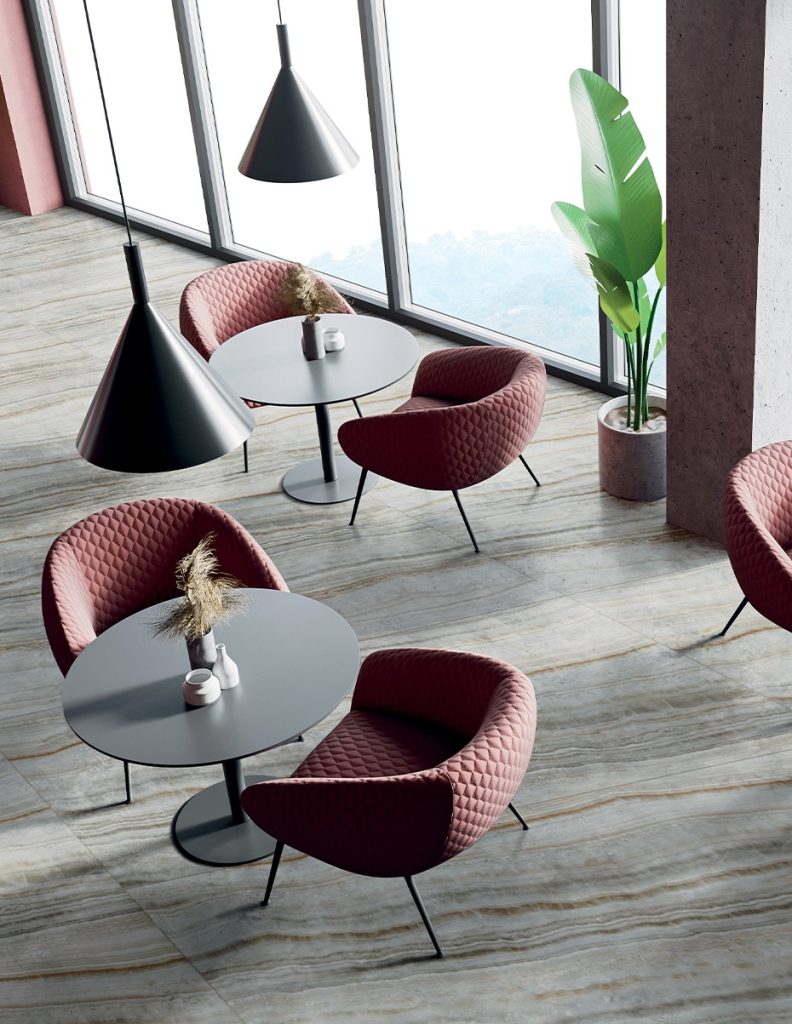Resistance to Deep Abrasion: Selecting the Right Tiles for Durability
Since we are looking for durable, abrasion-resistant tiles, let’s begin by defining abrasion resistance. Abrasive resistance (PEI) is the resistance to wear of the enamelled surface caused by human traffic, abrasive dirt contact, and movement of objects. The enamel’s resistance to wear increases with increasing PEI.
When choosing tiles for your rooms, it is crucial to consider their durability. Any tile can be used for the walls, but since the floor tiles must withstand foot traffic, they must be more resilient. Resistance to deep abrasion tiles is categorised into five classes: class 1 to class 5, where classes 1 & 5 are most and least resistant to abrasion, respectively. Class 3 tiles are perfect for high-traffic areas like kitchens and room hallways, whereas class 2 tiles are best suited for light household use.

Making Informed Tile Choices for Durability and Abrasion Resistance
Ceramic Coatings for Durability
Ceramic coatings have long been prized for their ability to withstand high temperatures and abrasion. These coatings are very effective at preventing wear in materials that require high hardness, abrasion resistance, chemical resistance, or degrade resistance. Various ceramic coatings, including alumina, zirconia, titanium dioxide, and chrome oxide, are used in thermal spraying. Because of their unique qualities, each of these materials is perfect for specific uses.
Ceramic Tiles
Ceramic tiles are a very sought-after choice for flooring due to their durability and the fact that they are economical. Made from clay and other natural elements through a high-temperature firing process, these are scratch-resistant tiles, making them ideal for busy areas like kitchens and hallways.
Since ceramic tiles are less dense than porcelain, they can be cut into various shapes and sizes more easily, though this also makes them less durable. As ceramic tiles are more likely to chip or break under pressure, customers may be reluctant to use them in places that are subject to high impact.
Choose a ceramic finish to increase the tiles’ longevity. This is a thin layer that gives porcelain and ceramic surfaces an additional degree of protection. Glazed ceramic tiles are a great choice for both outdoor and interior places where slip resistance is crucial, such as kitchen backsplashes and bathroom floors.
Porcelain Tiles
Compared to ceramic, porcelain is tougher and more resilient due to its increased density. Porcelain tiles, which are fired at greater temperatures, have harder surfaces that can sustain severe knocks. They are a great option for high-traffic places like outdoor spaces and office room tiles because of their resistance to stains, harsh chemicals, and normal wear and tear.
As porcelain tiles are completely waterproof, they are perfect for places that get a lot of moisture, such as bathrooms and the areas surrounding swimming pools. They are also appropriate for areas with fireplaces or stoves because of their great heat resistance. Although porcelain tiles are typically more expensive than ceramic tiles, they are ultimately a wise investment due to their superior durability.
Vitrified Tiles
There are several benefits to vitrified tiles, including less water absorption, increased durability, stain and scratch resistance, and more. These characteristics are combined in these expertly made tiles to give your house a chic and appealing appearance.
Vitrified tiles come in a variety of forms, each with a distinct function. A few examples include full-body, double-charged, glazed, and polished glazed vitrified tiles. A stronger choice, such as double-charged or full-body vitrified tiles, is advised for office room tiles that experience high levels of daily foot activity due to their durability and strength.
Timber Tiles
In addition to providing natural insulation and comfort underfoot, timber flooring is a fantastic way to bring warmth and colour to your room. However, it is expensive, requires frequent upkeep such as sanding, staining, and waxing, and fades over time. Additionally, it is not appropriate for high-humidity environments. Be sure to take the room’s intended use into account when selecting timber flooring.
Travertine Tiles
Travertine is a solid and extremely resilient kind of limestone that is created by mineral deposits in natural springs. Travertine tiles are especially appealing because of the lovely, organic appearance created by the stone’s natural patterns. Travertine is frequently utilized in wet places like showers, bathrooms, and pool surrounds because of its inherently non-slip texture. It’s also a popular option for feature walls, which give any room a sleek, modern look.
Conclusion
In conclusion, different flooring options have varying levels of durability; the most resilient materials are porcelain and natural stone, followed by ceramic and vinyl tiles. When selecting the proper tile, it’s critical to take into account the flooring’s intended usage, foot traffic, and possible exposure to heat, moisture, and acids.
According to the Porcelain Enamel Institute (PEI), a tile’s hardness rating—which goes from PEI 1 (fit for light foot traffic) to PEI 5 (made for high foot activity)—determines how long it will last. For residential settings, a PEI rating of three is usually sufficient; however, a higher grade can be needed for commercial spaces.
For durability, choosing tiles with the right PEI grade is essential. Over time, scratches and wear may result from using tiles that are not appropriate for their intended use or that have a lower PEI rating. Its PEI rating increases resistance to deep abrasion tiles.
